
 [rating=3]Unsettling and ominous, “Last Hermanos” can be an eye-opener about how U.S. immigration policy can affect the day-to-day lives of individual migrants. “Hermanos” means
[rating=3]Unsettling and ominous, “Last Hermanos” can be an eye-opener about how U.S. immigration policy can affect the day-to-day lives of individual migrants. “Hermanos” means “brothers” in Spanish, and this powerful, thought-provoking play by Exal Iraheta is about two siblings—Miguel (Estaban Andres Cruz) and Julio (Roberto Jay)—and how they constantly risk their lives traversing the U.S./Mexico border in both directions. Since the brothers want to remain employed and include friends and family members in their inner circle, they often journey hundreds of miles clandestinely between countries and from one safehouse to another. As both brothers travel southward together, they constantly endure the piercing sun, intense heat, and lack of potable water. Plus they must do their best to evade border guards and police officers, who might catch them or possibly leave them to rot in the desert without any food or drink. As the story begins, the brothers are traveling on foot and are currently hold up in a Texas state park where they are trying to assess their next move and obtain enough provisions to continue on with their journey into Mexico.
“brothers” in Spanish, and this powerful, thought-provoking play by Exal Iraheta is about two siblings—Miguel (Estaban Andres Cruz) and Julio (Roberto Jay)—and how they constantly risk their lives traversing the U.S./Mexico border in both directions. Since the brothers want to remain employed and include friends and family members in their inner circle, they often journey hundreds of miles clandestinely between countries and from one safehouse to another. As both brothers travel southward together, they constantly endure the piercing sun, intense heat, and lack of potable water. Plus they must do their best to evade border guards and police officers, who might catch them or possibly leave them to rot in the desert without any food or drink. As the story begins, the brothers are traveling on foot and are currently hold up in a Texas state park where they are trying to assess their next move and obtain enough provisions to continue on with their journey into Mexico.
Miguel and Julio are brothers by blood but are also brothers in spirit in that they can trust each other. At the onset of the show, we see how the two differ in their attitudes about religion, family life, and almost everything else. Yet they respect each other’s points of view and are willing to entertain conversations about issues where they disagree. Above all, they differ in who they trust. Julio, the younger brother, automatically distrusts white people, because they are white. The horrors he has previously witnessed, with people being rounded up like cattle and made to die in the desert, have affected his humanness. He is part of a militant movement and intends to die fighting for the dignity of Latinx and brown-skinned people in their struggle against white racism. As his hate has become so deeply rooted, Julio has become suspicious of practically everybody, and he can no longer let new people into his life. Miguel, like his brother, is extremely cautious when it comes to strangers, for just one poor judgment call can pose a threat to his continued life and well-being. But he is much less rigid than Julio in his outlook and more willing to believe that all people regardless of race, creed, or color can be good. Rather than wanting to fight alongside militants, Miguel ultimately wants to live in peace and harmony with everyone.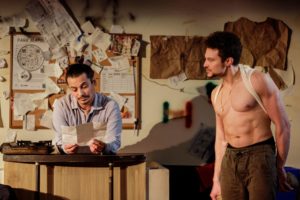
Enter Shepard (Chris Sheard), a sympathetic white man from the United States with family in Mexico, who seems to know a bit too much about the location of the various safehouses in the area. Above all, he seems to know a bit too much about Miguel and Julio. He appears very generous to Miguel in giving him food and water for himself and his brother, but the audience cannot help but be suspicious of him and his intentions. Is he on the level or is he setting a trap to capture the two brothers who dare to cross the border? Yet as a result of his more open belief system, Miguel is willing to take a chance on Shepard, wherever that may lead.
Director Ismael Lara, Jr. does a great job utilizing a very small stage in a venue with only 63 seats. We see a functional set, mostly meant to look like a safehouse, nicely designed by Mara Ishihara Zinky. The borderlines of the set are meant to depict the outdoors. Lighting by Josiah Croegaert essentially demarcates the various spaces and the time of day, such that the scenery—and cinematography—is left to the audience’s imagination. Sound by Joe Court is perfect, and costumes by Johan Gallardo are very appropriate. Props are good, and one of the most important of them is the pot inside the safehouse, which the brothers use to boil dirty water, so as to be able to drink it without getting sick.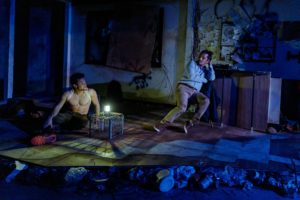
The reason this show is called “Last Hermanos” is because the brothers are ultimately the last two people traversing the border with a sense of trust in each other, considering that they live in a no-win situation where everybody is suspicious of the next person. We can feel for their tenuous circumstances and can understand how violence and the threat of violence permeate nearly every aspect of their daily living. In fact, Miguel and Julio may be thought to be symbolic of a good number of undocumented individuals, who have made a home for themselves in the United States or Mexico but have spouses, children, siblings, parents, or grandparents living in another country. The themes brought up in this show are pivotal regarding whether those coming across the border in either direction should be treated like people or like chattel.
The physical and psychological violence depicted in this play can be disturbing, and one of the critics in the audience continually put his head down, because he didn’t want to witness it. But while the violence is important to the plot, it somehow seems more than necessary to get the playwright’s point across: that there can be all sorts of dire consequences when the issue of immigration is not adequately addressed by policymakers in the United States and Mexico—and by extension by policymakers throughout Central and South America—considering that “El Norte” is the preferred destination for many escaping poverty or political persecution or simply seeking a better life. Hence, the audience comes to understand that a better way is needed to make border crossings to and from the United States safer and more civilized. This is for the sake of both the migrants and the border guards, who often become the point people in enforcing a set of cruel and discriminatory policies that they may not necessarily agree with. Given the status quo at the southern border, however, not only are families and relationships currently being ripped apart, but spirits and bodies are being broken, and everybody suffers.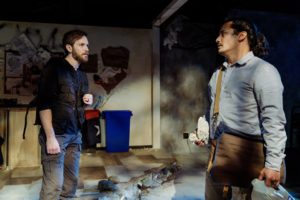
“Last Hermanos” is playing at A Red Orchid Theatre, 1531 N. Wells Street, Chicago, through June 12, 2022.
Tickets are $15-$40 each.
Performance schedule:
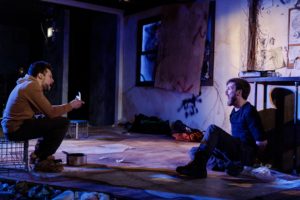 Thursdays and Fridays – 7:30 p.m.
Thursdays and Fridays – 7:30 p.m.
Saturdays – 3:00 p.m. and 7:30 p.m.
Sundays – 3:00 p.m.
To purchase tickets, please call 312-943-8722 or visit https://web.ovationtix.com/trs/cal/27605?sitePreference=normal
Note that they are a paperless theatre, so you will receive your physical ticket onsite.
For more information about “Last Hermanos”, go to: https://aredorchidtheatre.org/current-season/ and scroll down to the bottom of the page.
For general information about A Red Orchid Theatre and to learn about other shows and upcoming performances, please go to www.aredorchidtheatre.org.
You can also check out their Facebook page at: https://www.facebook.com/aredorchid.
Note that COVID restrictions are in effect as of this writing. You will need to present a proof of vaccination card and an ID to get inside the venue. Audience members must wear masks throughout the entire performance. There are no concessions.
To see what others are saying, visit www.theatreinchicago.com, go to Review Round-Up and click at “Last Hermanos”.




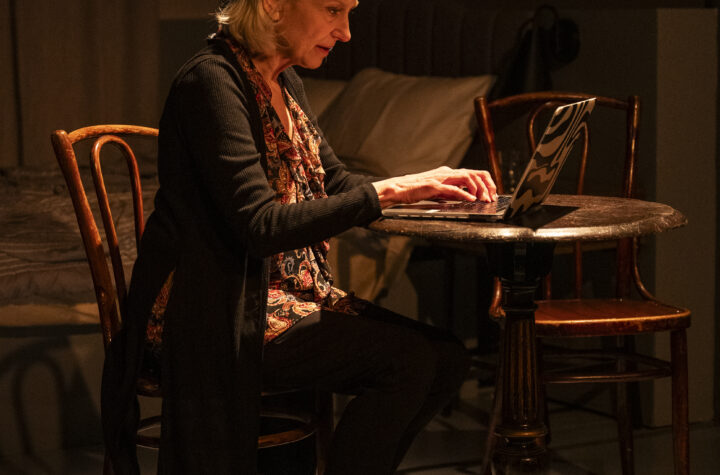

More Stories
“Titanique”
“Sunny Afternoon” reviewed by Carol Moore
“No Such Thing”